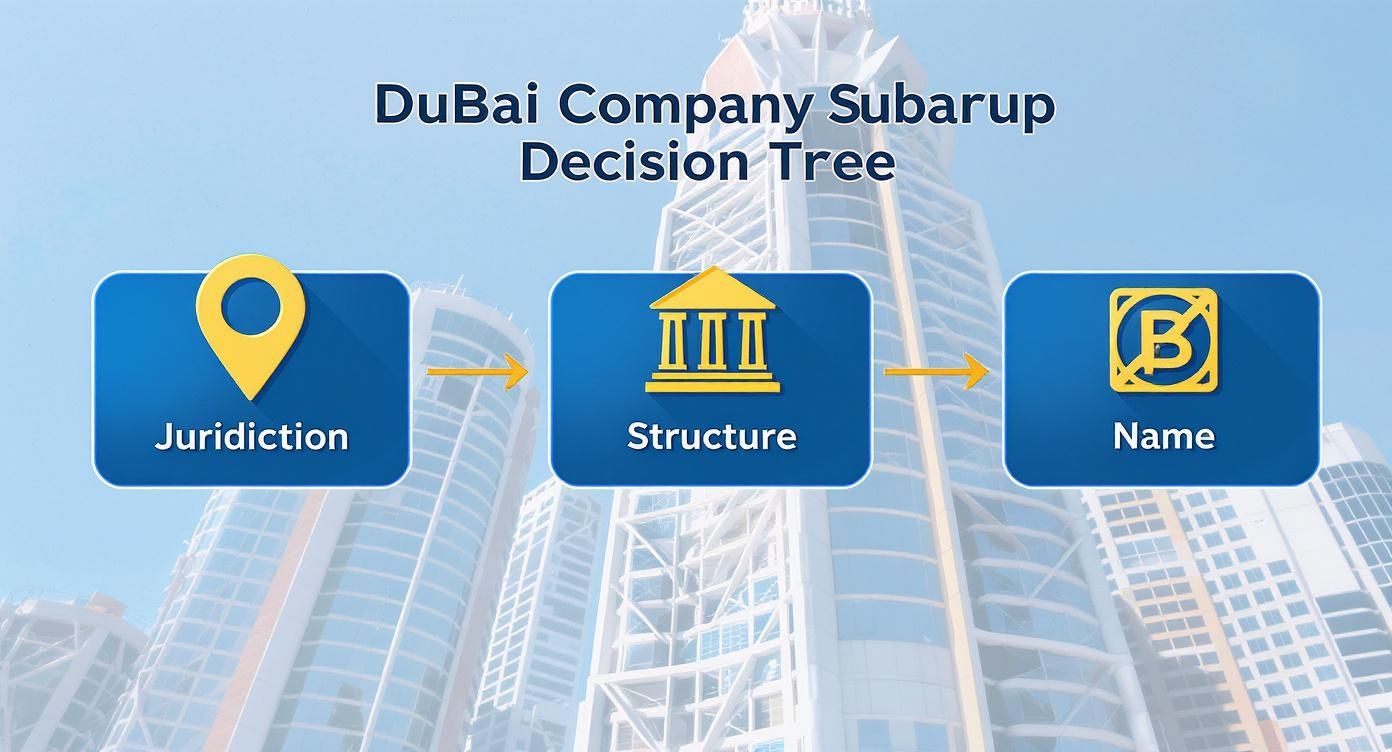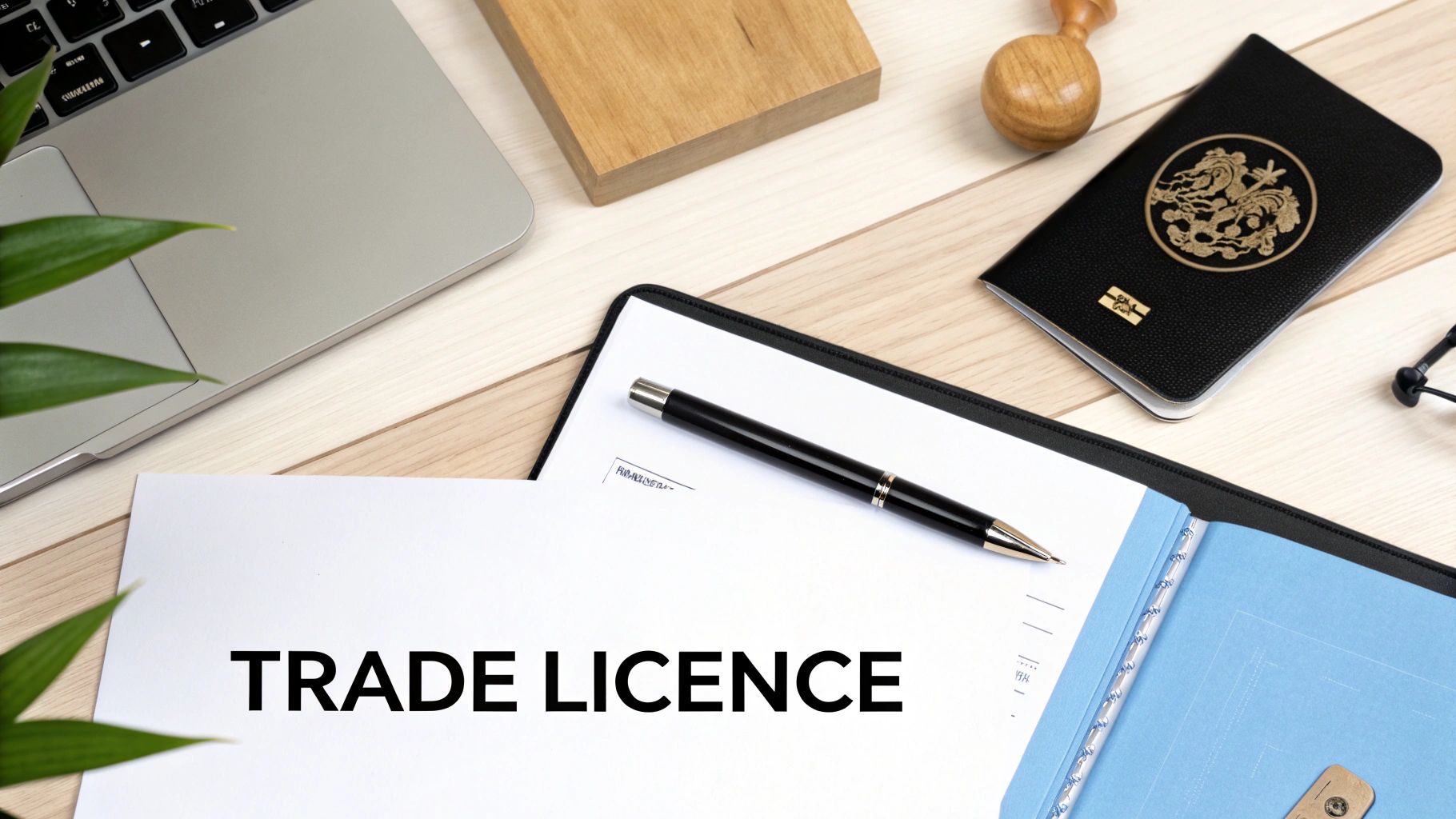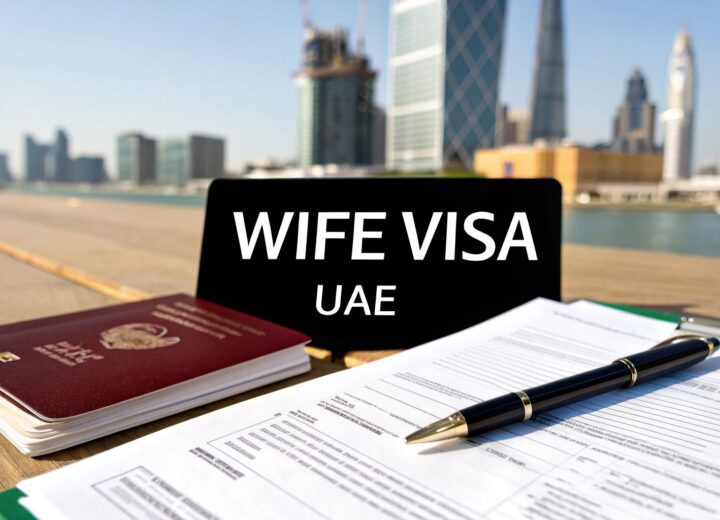Before you can register a company in Dubai, you'll need to make a few key decisions. It starts with figuring out your business jurisdiction—are you going for Mainland or a Free Zone? From there, you'll pick a legal structure and lock in a unique trade name. These aren't just boxes to tick; they’re the foundation for your market access, ownership rights, and how you'll operate in the UAE's buzzing economy.
Your First Steps to a Dubai Company Registration
Kicking off your business journey in Dubai is all about laying a solid groundwork. These first choices you make are more than just paperwork—they're strategic moves that will guide your company's growth and define its legal standing for years to come. Getting a handle on these core elements—jurisdiction, legal structure, and trade name—is the most important first step to a smooth launch.
Think of it as drawing up the blueprint before the builders arrive. A wrong move now can lead to expensive headaches later on. For instance, picking the wrong jurisdiction might fence you off from your target market, while the wrong legal structure could leave you open to unnecessary risk.
Selecting Your Business Jurisdiction
Your first big call is deciding where your company will be based. Dubai offers three main options, each designed for different business models.
- Dubai Mainland: This is your best bet if you plan to trade directly within the UAE local market. A Mainland company can do business anywhere in the Emirates and is able to bid on those valuable government contracts. It’s the perfect setup for retail stores, restaurants, or any service-based company aiming for the local crowd.
- Dubai Free Zone: If your business is geared towards international trade or serves clients outside the UAE, a Free Zone is usually the smarter move. Dubai has over 40 specialised Free Zones, each focused on specific industries like tech, media, or commodities. The perks are hard to ignore: 100% foreign ownership, zero corporate and personal income taxes, and the ability to take all your profits home.
- Dubai Offshore: The third option, an Offshore company (or International Business Company), is a bit different. It’s set up to conduct business outside the UAE, acting as a holding company for assets or real estate. It offers complete tax exemption and confidentiality but isn't allowed to trade within the UAE market.
To put it into perspective, a global software company might set up in Dubai Internet City to tap into the tech ecosystem and tax benefits. On the other hand, a local construction firm would almost certainly choose a Mainland licence to work on projects across the city.
Choosing the right jurisdiction can feel overwhelming at first. Here’s a quick breakdown to help you compare the key differences.
Dubai Jurisdiction Quick Comparison
This table gives you a side-by-side look at the three primary business jurisdictions in Dubai, helping you make a more informed decision right from the start.
| Feature | Mainland | Free Zone | Offshore |
|---|---|---|---|
| Ownership | 100% foreign ownership for most activities | 100% foreign ownership | 100% foreign ownership |
| Scope of Business | Can trade anywhere in the UAE and internationally | Primarily trades within the Free Zone and internationally | Cannot trade within the UAE; only internationally |
| Office Space | Physical office is mandatory | Can use flexi-desks or physical offices | No physical office required; virtual office only |
| Visas | Unlimited visas (depends on office size) | Limited visas (depends on office size/package) | No visas issued |
| Government Contracts | Eligible to bid on government projects | Not eligible | Not eligible |
| Taxation | 9% corporate tax on profits over AED 375,000 | 0% corporate tax for qualifying income | 0% corporate tax |
| Auditing | Mandatory for certain activities | Mandatory for most Free Zones | Not always mandatory |
Each option has its own clear advantages, so your choice should really come down to what your business actually needs to do.
Choosing the Right Legal Structure
After you've picked a jurisdiction, your next move is to choose a legal structure. This is the legal "form" of your company, and it dictates how your business is owned and run. The options you have will depend on your jurisdiction and business activity.
A popular and versatile choice on the Mainland is the Limited Liability Company (LLC), which shields your personal assets from business liabilities. In the Free Zones, you'll often see options like a Free Zone Establishment (FZE) if you're a single shareholder, or a Free Zone Company (FZC) if you have multiple partners. Getting this right is crucial for liability protection and making sure your business can grow without legal hurdles.
Choosing the right jurisdiction and legal structure from the outset is the most critical factor in a smooth and cost-effective business setup. It aligns your operational needs with the regulatory environment, preventing costly restructuring down the line.
Reserving Your Company Trade Name
Finally, it's time to choose and reserve a unique trade name. This is your brand's identity, and it needs to follow the UAE’s naming rules. The name can’t be offensive, blasphemous, or step on any existing trademarks. It also can’t be the same as a company that's already registered.
The process involves submitting your preferred name to the right authority—that’s the Department of Economy and Tourism (DET) for Mainland companies or the specific Free Zone authority. Once they give it the green light, the name is reserved for you.
Dubai’s business scene is growing incredibly fast. In the first half of 2025 alone, the city saw a huge jump in new company registrations. According to the Dubai Chamber of Commerce, a staggering 35,500 new companies were registered between January and June 2025. This rush highlights just how important it is to secure a unique and compliant trade name as early as you can. You can explore more on Dubai's economic growth to get a sense of the momentum.
Choosing Your Jurisdiction: Mainland vs. Free Zone
This is probably the single most important decision you'll make when you register a company in Dubai. Picking between a Mainland and a Free Zone setup isn't just about choosing an address. It's a strategic move that defines who you can do business with, your ownership structure, and your company's potential for growth down the line.
To get a clearer picture, it helps to look at the different kinds of understanding business structure types available globally. Each has its own rules and perks, much like the choice between Mainland and Free Zones here in the UAE. Getting this right from the start puts your business in the best possible environment to succeed.
Unlocking the Local Market with a Mainland Setup
Think of a Dubai Mainland company as your all-access pass to the entire UAE market. Unlike a Free Zone company, a Mainland licence gives you the freedom to trade directly with any customer or business across all seven emirates, with zero restrictions. This is non-negotiable for businesses like retail shops, local service providers, or consulting firms that need to be on the ground, interacting with the domestic economy.
On top of that, a Mainland setup is your only path to winning lucrative government contracts. If bidding on public sector projects is part of your business plan, the choice is already made for you.
One of the biggest game-changers recently is that most activities on the Mainland now allow for 100% foreign ownership. This has done away with the old rule requiring a 51% Emirati partner. However, some professional services will still need a Local Service Agent (LSA)—a UAE national who acts as your government liaison for paperwork but holds no shares and has zero control over your business.
This infographic gives you a quick visual on how that initial choice of jurisdiction kicks off the entire process.

As you can see, everything else flows from this foundational decision.
Capitalising on Global Opportunities in a Free Zone
If your focus is on international trade, Free Zones offer a seriously compelling package. These are dedicated economic zones, each with its own independent authority, built to help specific industries thrive.
The advantages are hard to ignore:
- Zero Corporate Tax: Qualifying income inside a Free Zone often comes with a 0% corporate tax rate.
- Full Profit Repatriation: You are free to send 100% of your profits and capital back to your home country without any hurdles.
- Customs Duty Exemptions: Importing and exporting goods through the Free Zone is typically exempt from customs duties.
- 100% Foreign Ownership: This is standard across the board, giving you complete control.
The real power of a Free Zone is its specialised, low-tax ecosystem. It’s a support system designed for specific sectors like tech, media, or finance, connecting businesses with the right infrastructure and talent pool to flourish.
But remember, Dubai's Free Zones are not all the same. Each one is a purpose-built hub. For instance:
- Dubai Multi Commodities Centre (DMCC): The go-to for anyone trading commodities like gold, diamonds, or coffee.
- Dubai Media City (DMC): A vibrant community for creative agencies, production houses, and media firms.
- Dubai International Financial Centre (DIFC): A globally recognised centre for finance, fintech, and wealth management, operating under its own common-law framework.
The success of these specialised zones speaks for itself. The Dubai International Financial Centre (DIFC), for example, welcomed 1,081 new active registered companies between January and June 2025 alone—a 32% jump from the previous year. That brought its total number of active firms to 7,700, a clear sign of global confidence.
Picking the right zone means matching it perfectly to your business activities. If you're exploring this path, our detailed guide to Dubai free zone company formation can shed more light on the specifics. Our team offers 24/7 support to make the entire process straightforward, whether you're setting up in Dubai, Sharjah, or Abu Dhabi.
Getting Your Trade Licence and Paperwork in Order
With your jurisdiction and company name locked in, it's time to dive into the paperwork. This is the moment your business idea starts becoming a real, legally recognised company in Dubai. The entire process revolves around getting your trade licence, which is basically the government's official permission for you to operate. Getting this stage right is crucial to avoid any frustrating delays down the line.

First things first, let's get your core documents together. The exact list can differ slightly depending on whether you're setting up on the Mainland or in a Free Zone, but some documents are always required. Think of it as creating a complete profile of your new venture for the authorities.
Your Essential Paperwork Checklist
To kick things off, you'll want to have a neat and organised file ready. Here are the usual must-haves:
- Passport Copies: Every shareholder and the company manager will need to provide clear, colour copies of their passports. This is non-negotiable.
- Entry Stamp or Visa Page: If you're not a UAE national, you'll need to show proof of your legal entry into the country.
- Business Plan: Many Free Zones, and even some Mainland authorities for certain activities, will ask for a straightforward business plan. It just needs to outline what you do, who your customers are, and your main goals.
- Memorandum of Association (MOA): This is the big one. It's a legal document that lays out the company's rules, who owns what percentage, and how it will operate. For a Mainland LLC, this document has to be officially notarised.
Having these ready from day one can save you a ton of back-and-forth, which is often what stalls an application. It’s also a smart move to get them attested where required. Our corporate PRO services can handle all the document attestation for you, making sure everything is compliant and saving you a major headache.
Choosing the Right Licence for Your Business
A common trip-up for new entrepreneurs is picking the right type of trade licence. Your choice here is tied directly to what your business actually does. Dubai groups licences into three main categories, and each one covers a different kind of operation.
It’s really important to have a clear list of your business activities. You can find a lot of great info in our guide on how to get a trade license in Dubai. This will help you apply for the right category from the get-go.
Here’s a quick look at the main licence types:
- Commercial Licence: Perfect for any business that involves buying and selling goods. Think trading, import/export, and retail shops. It's one of the most popular licences out there.
- Professional Licence: This one is for service-based businesses and skilled professionals—consultants, auditors, designers, and artisans, for example. The great thing about this licence is that it allows for 100% foreign ownership on the Mainland, though you'll usually need a Local Service Agent (LSA).
- Industrial Licence: If you’re manufacturing, producing, or assembling products, this is the licence for you. It involves getting approvals from different ministries and requires a physical factory or warehouse space.
Picking the wrong licence can lead to hefty fines or even force you to stop operating altogether. So, it's vital to match your business activities perfectly with the right licence.
Getting the 'initial approval' is a key milestone. It’s the government's first nod of approval, confirming they're okay with your company name, activities, and shareholders. This happens before you have to commit to big expenses like an office lease.
The Application and Approval Journey
Once your documents are prepped and you know which licence you need, you can submit your application for initial approval. This is your formal request to the relevant authority to set up your business.
For a Mainland company, this application goes to the Department of Economy and Tourism (DET) in Dubai. If you're going the Free Zone route, you'll submit it directly to that specific authority, like the DMCC or Dubai Airport Freezone (DAFZA).
Company registrations in Dubai have been on a steady rise for years. The move to online e-services has massively sped things up, cutting the registration time down to just a few days in many cases. The UAE’s business-friendly policies, like full foreign ownership in Free Zones and zero income tax, keep pulling in entrepreneurs from all over the world.
After you get that initial approval, you're on the home stretch. This typically involves signing the MOA, finalising your office lease (Ejari), and paying the final fee for your trade licence. Our team is here to make sure this final stage is just as smooth as the first, offering cost-effective solutions and 24/7 support for any questions you might have along the way.
Getting Your Office and Bank Account Sorted
You’ve got your trade licence in hand – a massive milestone. Now it’s time to move from the world of paperwork to the practical side of things: setting up your physical office and getting your corporate bank account opened. These aren't just boxes to tick; they are the foundations of your day-to-day business operations and your ability to grow in Dubai.
Getting these last few steps right is crucial. While the toughest legal bits are behind you, the choices you make here will determine how smoothly your company can start issuing visas, sending invoices, and actually doing business.

Securing Your Physical Address in Dubai
Every single company in Dubai, whether it's on the Mainland or in a Free Zone, absolutely must have a registered physical address. This is more than just a mailing address; it's a legal requirement that’s tied directly to your trade licence and, just as importantly, your visa eligibility. The type of office you pick can seriously impact both your budget and how many staff you can hire.
For new entrepreneurs and international businesses just finding their feet, Dubai has a whole spectrum of flexible and affordable office solutions.
- Flexi-Desks and Co-working Spaces: These are a perfect fit for startups, solopreneurs, and small teams. A flexi-desk gives you a legitimate business address and access to shared facilities without the hefty price tag of a traditional lease. It's often the most cost-effective way to get up and running and is an option in nearly every Free Zone.
- Serviced Offices: Think of this as a step up. A serviced office provides a private, fully-furnished space but with shared perks like a receptionist and meeting rooms. You get more privacy and a professional feel, but still with flexible terms.
- Dedicated Physical Offices: If your plan involves hiring a bigger team, then a traditional office lease (known as an Ejari in Dubai) is non-negotiable. The number of employment visas your company can apply for is directly linked to the size of your office space. The general rule of thumb is one visa for every 80-100 square feet.
Choosing your office is a strategic move. You can always start with a flexi-desk to keep initial costs down and then upgrade to a bigger space once your business starts to scale and your team expands.
Your choice of office space is more than just an address—it's a tool for growth. It dictates your initial setup costs and directly influences your visa quota, impacting how quickly you can build your team.
The Real Deal on Opening a Corporate Bank Account
Opening a corporate bank account in the UAE can be a surprisingly detailed affair, and it often catches new business owners off guard. Banks here operate under strict due diligence and Know Your Customer (KYC) rules to comply with global anti-money laundering (AML) regulations. If you're not prepared, you could face some serious delays.
The secret to a smooth process? Being over-prepared. You need to walk in with a comprehensive file of documents that tells the bank a crystal-clear story about your business, its owners, and its purpose.
Here’s a quick checklist of what nearly every bank will ask for:
- Corporate Documents: Your trade licence, Memorandum of Association (MOA), and any share certificates.
- Shareholder and Manager IDs: Clear copies of passports, UAE visa pages, and Emirates IDs for all shareholders and the company manager.
- Proof of Address: A recent utility bill for each shareholder to verify their residential address.
- Business Profile: A well-written summary of your business activities, who you'll be selling to, your expected turnover, and any key clients or suppliers.
- Source of Funds Declaration: Information explaining where the initial capital for the business came from.
Picking the right bank is just as important. Some banks are very comfortable working with startups, while others are geared towards large, established multinational corporations. As business setup specialists, we can point you towards banks that are the best fit for new companies and make sure you tick all their specific boxes. Our 24/7 support means we’re always on hand to help, from getting your documents in order to speaking with the bank for you. We use our experience to make this final, critical step as painless as possible, helping you tap into the tax benefits that make the UAE so attractive for international entrepreneurs.
Getting Your Visas Sorted with PRO Services
Alright, you've got your trade licence and the company bank account is live. Now for the final, and arguably most important, piece of the puzzle to register a company in Dubai: getting your visas activated. This is the green light that allows you, your business partners, and any staff to legally live and work in the UAE.
It all starts with something called an Establishment Card. Don't let its small size fool you; this card is a massive deal. It officially registers your new company with the immigration and labour authorities, which in turn unlocks your ability to sponsor visas. Simply put, without it, you can't hire anyone, not even yourself.
First Up: Your Investor Visa
As the business owner, getting your own residence permit sorted is the top priority. This is often called an investor visa or partner visa, and it solidifies your legal status as a resident in the UAE. The process is a series of steps that have to be done in a specific order, so paying attention to the sequence is key.
It kicks off with an entry permit, which is basically a temporary visa that lets you stay in the country while everything else is processed. Next, you'll head off for a mandatory medical fitness test. This involves a standard blood test and a chest X-ray to screen for any communicable diseases – a routine check for all new residents.
With a clean bill of health, you’ll then do your biometrics for the Emirates ID card. This is a quick appointment where they take your fingerprints and a photograph. Your Emirates ID will become your go-to form of identification for almost everything in the UAE, from signing an apartment lease to setting up a personal bank account. The final step is the visa stamping in your passport, which makes your residency official.
Sponsoring Your Team and Family
Once your own visa is stamped and active, you can start the process for your employees. The steps are very similar to what you just went through: an entry permit, the medical test, and Emirates ID biometrics for each team member. As your company starts to grow, you can see how managing several applications at once could quickly eat up your time.
On a personal note, as a legal resident, you can also sponsor your immediate family, like your spouse and children. This involves a bit more paperwork, such as attested marriage and birth certificates. For anyone moving their family to Dubai, getting this part right is crucial for a smooth transition into your new life.
The visa process itself is straightforward, but it’s incredibly precise. One missing document or a small mistake on a form can cause frustrating delays, costing you precious time and money right when you’re trying to get your business off the ground.
Why Expert PRO Services Make All the Difference
Let’s be honest, dealing with all the government paperwork—from that first visa application to renewing your licence and getting documents attested—can feel like a full-time job. This is exactly where professional PRO (Public Relations Officer) services become a lifesaver.
A good PRO team acts as your official go-between, handling all the submissions and follow-ups with government bodies like the Ministry of Human Resources and Emiratisation (MOHRE) and the General Directorate of Residency and Foreigners Affairs (GDRFA).
Handing this over to the experts just makes sense:
- You save a ton of time: Forget spending hours in queues at government centres. You can focus on actually running your business.
- Mistakes are avoided: PROs know the exact requirements inside and out, preventing costly errors that lead to re-submissions.
- Things move faster: Their established relationships with government departments can often speed up the approval process.
- Total peace of mind: You can relax, knowing that all the legal and administrative tasks are being handled correctly and on time.
Our team offers dedicated corporate PRO services in Dubai, taking care of everything from visa processing and document attestation to handling all your renewals. We provide 24/7 support and create cost-effective plans that fit your company's needs, whether you're based in Dubai, Sharjah, or Abu Dhabi.
Got Questions About Setting Up in Dubai? We Have Answers
Even with the clearest plan, you’re bound to have a few questions as you start the process to register a company in Dubai. It’s completely natural. This is where we clear up some of the most common queries we get from entrepreneurs just like you, covering everything from budgets and visas to the latest ownership laws.
How Much Does It Really Cost to Get Started?
This is usually the first question on everyone's mind, and the honest answer is: it depends. There’s no one-size-fits-all price tag because the final cost is shaped by the specific decisions you make for your business.
A few key things will influence your total investment:
- Your Chosen Jurisdiction: A straightforward Free Zone package can often be secured for somewhere between AED 15,000 and AED 25,000. Mainland setups, on the other hand, have a different fee structure that shifts based on your business activity and any special approvals you might need.
- Your Business Activity: Certain specialised fields need extra nods from government bodies, and these approvals come with their own fees.
- Your Office Space: Opting for a flexi-desk is a much lighter financial lift compared to leasing a dedicated physical office. This choice alone can dramatically change your initial costs.
- Your Visa Needs: The number of residence visas you plan to issue will also factor into the final bill.
To get a real, actionable number, a customised quote is the only way to go. We can put together a cost-effective plan that lines up perfectly with what you need.
Does Registering a Company Get Me a Residence Visa?
Yes, absolutely. In fact, for many people, setting up a business is the most direct route to getting a UAE residence visa for themselves, their families, and any staff they plan to hire. As the business owner, you’re immediately eligible to apply for an investor or partner visa.
These visas are typically valid for two or three years and are fully renewable. How many employee visas you can sponsor often depends on the size of your office and the type of business licence you hold. For investors making a substantial commitment, this can also be your ticket to the prestigious Golden Visa programme, which offers long-term residency. Our team has deep expertise in both standard Investor Visas and the more specialised Golden Visas linked to property investment.
A common misunderstanding is that company setup and visa processing are two separate journeys. They’re actually deeply connected. Your company’s legal registration is what grants you the power to sponsor residency permits, making it the bedrock of your new life in the UAE.
Do I Still Need a Local Sponsor in Dubai?
This is a big one, and the news here is excellent. The rules have changed significantly for the better. For almost all commercial and industrial business activities on the Dubai Mainland, the old rule requiring a 51% Emirati partner is gone. You can now enjoy 100% foreign ownership of your Mainland company.
But there is one important distinction to keep in mind. If you’re setting up a professional services business—like a consultancy, a law firm, or an engineering practice—you will still need what’s called a Local Service Agent (LSA). An LSA is a UAE national who acts as your formal representative for government paperwork and administrative processes.
Crucially, an LSA holds zero shares in your company and has no say in how you run it. They are paid a fixed annual fee for their services, which means you keep full ownership and complete operational control. It’s a modernised approach that gives you full access to the Mainland market while keeping your investment entirely your own.
Figuring all this out is much easier when you have an expert in your corner. We are specialists in Mainland company formation in Dubai, Sharjah & Abu Dhabi, as well as Freezone company formation across the UAE. We also provide dedicated support for Golden Visas, Investor Visas, Corporate PRO Services, and attestation services.
✅ Specialists in Mainland Company Formation in Dubai, Sharjah & Abu Dhabi
✅ Specialists in Freezone Company Formation across the UAE
✅ Specialists in Golden Visa on Property and Investor Visa
✅ Specialists in Corporate PRO Services and Attestation Services
✅ 24/7 Support Service – Always here when you need us
✅ Cost-Effective Business Setup Solutions tailored to your needs
✅ Enjoy UAE Tax Benefits for International Entrepreneurs
📞 Call Us Now: +971-54-4710034
💬 WhatsApp Us Today for a Free Consultation at https://prodesk.ae





